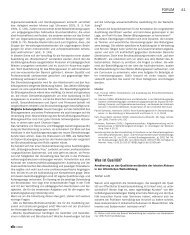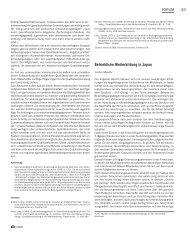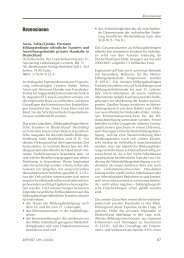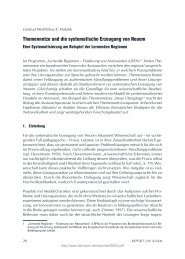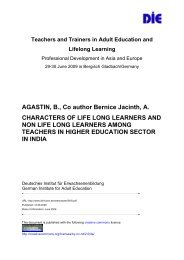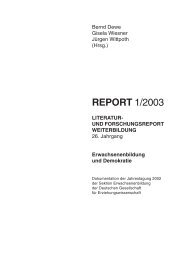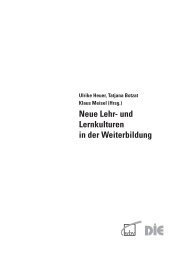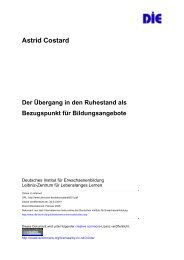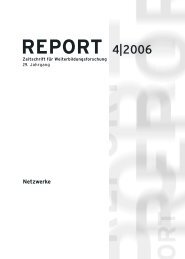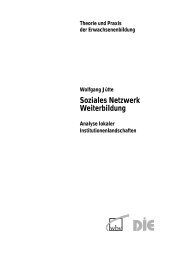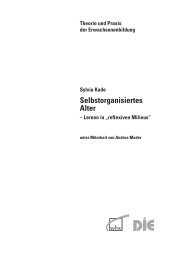Accreditation of Prior Experiential Learning (APEL)
Accreditation of Prior Experiential Learning (APEL)
Accreditation of Prior Experiential Learning (APEL)
You also want an ePaper? Increase the reach of your titles
YUMPU automatically turns print PDFs into web optimized ePapers that Google loves.
ment, however, implies development, or at least the opportunity for development, so<br />
the learning which is experiential, being personal, is rooted in the idea <strong>of</strong> human growth<br />
and development, hence the interest in the connections between personal learning<br />
and public recognition in relation to empowerment” (Evans 1992, p 85).<br />
For Challis (1993) the fact that <strong>APEL</strong> is completely student-centred makes it an empowering<br />
process for the learner which also increases their self-confidence: “The assessment<br />
and accreditation <strong>of</strong> what is revealed through this process takes place against<br />
criteria that are known to the learner, and against which suitable evidence <strong>of</strong> competence<br />
has been prepared and matched. The process is therefore one <strong>of</strong> empowerment,<br />
and makes the concept <strong>of</strong> ‘failure’ irrelevant. The process is non-competitive, because<br />
each learner’s experience and learning is different from any other’s“ (Challis 1993,<br />
p 6).<br />
Many adults who use <strong>APEL</strong> at the undergraduate level are non-traditional in the sense<br />
that they lack traditional qualifications and are from lower socio-economic backgrounds.<br />
By engaging in the <strong>APEL</strong> process they are developing different kinds <strong>of</strong> cultural and<br />
intellectual capital. The acceptance <strong>of</strong> <strong>APEL</strong> as a new form/process <strong>of</strong> knowledge has<br />
been more readily evident in the new or reform universities in Europe. A key issue for<br />
the future development and expansion <strong>of</strong> <strong>APEL</strong> in universities is how to break down<br />
the resistance to ‘really useful knowledge’ in the traditional universities as it requires a<br />
cultural shift and institutional change. Challenging elite assumptions about the nature<br />
<strong>of</strong> knowledge will not be easy. In the past academics in new disciplines such as sociology<br />
and gender studies initially struggled to embed their subjects in academia. Although<br />
now well established they are located at the lower end <strong>of</strong> the knowledge hierarchy.<br />
There are signs in the UK that a few traditional universities are being more open<br />
to <strong>APEL</strong> systems, albeit on the margins <strong>of</strong> the curriculum and institution.<br />
<strong>APEL</strong> has a critical function to play in bridging formal and informal learning and breaking<br />
down the boundaries and hierarchy between the two. Informal learning is ‘useful<br />
knowledge’ as the radical adult education tradition has advocated for a number <strong>of</strong> years.<br />
<strong>APEL</strong> recognises this. <strong>APEL</strong> processes could act as a transformative mechanism in terms<br />
<strong>of</strong> knowledge and learning. Habermas’s concept <strong>of</strong> communicative action is useful here<br />
as <strong>APEL</strong> values the voices <strong>of</strong> learners and what they say about knowledge and learning.<br />
There is also, however, the danger that informal learning becomes transformed and translated<br />
into formal learning and academic knowledge by <strong>APEL</strong> processes.<br />
Over the past twenty years the doors <strong>of</strong> universities have been gradually widening to<br />
allow, reluctantly in some institutions, adults into the world <strong>of</strong> academia at undergraduate<br />
level. However, the process has not been even either within national states or<br />
across Europe. In theory <strong>APEL</strong> is a vital tool in enabling adults without the traditional<br />
qualifications required for entrance or those who have been out <strong>of</strong> the education system<br />
for a long time to access universities and some universities do implement <strong>APEL</strong> for<br />
this purpose. <strong>APEL</strong> systems also build the learner confidence <strong>of</strong> adult students allowing<br />
65


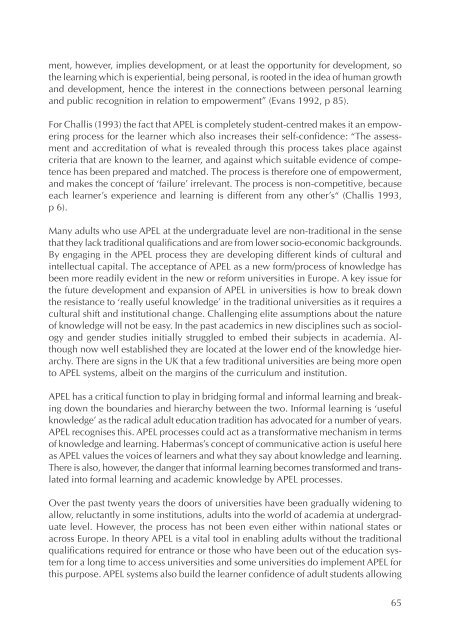
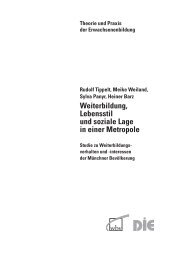
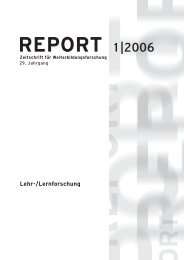
![PDF [KB 892] - Deutsches Institut für Erwachsenenbildung](https://img.yumpu.com/7495168/1/144x260/pdf-kb-892-deutsches-institut-fur-erwachsenenbildung.jpg?quality=85)
